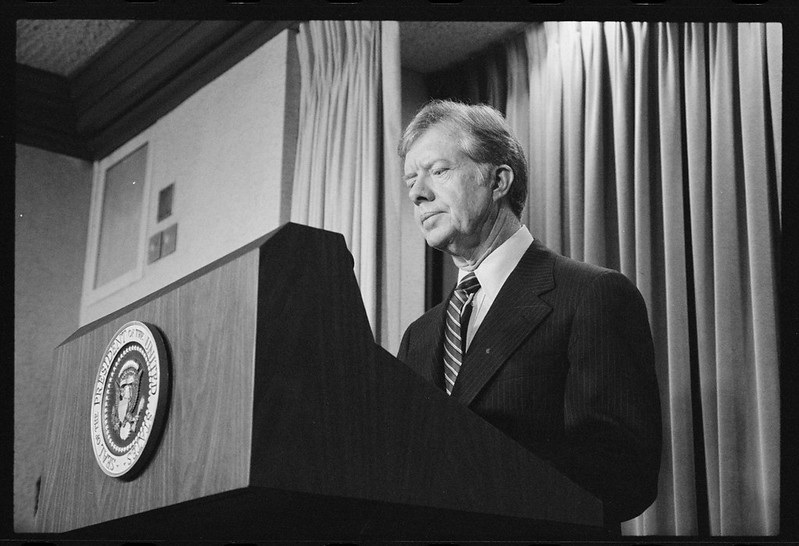
President Jimmy Carter announces sanctions on Iran, 1980.
Photograph by Marion S. Trikosko, Library of Congress. Public domain/no known restrictions.
Jimmy Carter was there when my congregation needed him: Remembering a president
January 6, 2025
I had the honor of meeting President Jimmy Carter at a talk he gave at Memorial Church at Harvard University in 2014, where he was promoting his book “A Call to Action: Women, Religion, Violence, and Power.” I’ll never forget his kindness in taking a minute to speak with me as he signed my copy of the book, but what made the most impact on me that day was the speech he gave. He talked about his time in the presidency, saying that there are many measures of greatness, but during his term in office, for four blessed years, “we did not fire a bullet or drop a bomb,” and that this was one of the only periods in American history where this is true. As he finished the speech, I could not resist starting a chant that echoed in those hallowed halls: “four more years!”
Jimmy Carter presented the kind of humble, gracious leadership that is in strikingly short supply in America these days. He also understood something about faith that many of our leaders seem to have forgotten or never bothered to learn — when it comes to religion, it is not how you rule that matters, but how you serve.
Better political writers than me can give an appraisal of his one presidential term from 1977-1981, but in my opinion, it was not his presidency but what he did afterwards that inspired millions. In Memorial Church that day, President Carter said that being a former president was the best job in the world, and he lived out that fondness for his post-presidential life serving others. The Carter Foundation worked tirelessly to eliminate Guinea worm disease, and produced results. In 1986, when the foundation began its work, there were 3.5 million cases in Africa and Asia. In 2024, there were 7. His efforts with Habitat for Humanity are well documented – he and his beloved wife Rosalynn spent 1 week a year since 1984 working to build houses for those unable to afford them. Plenty of people talk about solving problems like the housing crisis, but he lived out a commitment to addressing them personally.
At each of the congregations I have served, all of them American Baptist, someone has told me that they identify as a “Jimmy Carter Baptist.” This comment always needed no explanation — it was a rejection of the types of cruelty and insularism that often attend the label “Baptist.” For many, President Carter charted a way to be a person of faith and a progressive at the same time.
President Carter knew that those who lack housing or food are not merely political pawns, but the real presence of God in our midst. What we do, or don’t do, to serve them reveals everything about what we value in our world and in our congregations.
Without a doubt, his stand on issues like women’s leadership and the New Baptist Covenant, which promotes social justice and racial reconciliation within Baptist life, leave an enduring legacy within Baptist congregations and denominations beyond those he called home — the Cooperative Baptist Fellowship and the Southern Baptist Convention.
When I began as senior minister of Lake Street Church of Evanston in 2019, one of the things that I was most excited about was serving a congregation where President Carter had sat in its pews. President Carter’s son, Jack, was a member at Lake Street for many years, and through this relationship President Carter became a friend of our congregation, attending worship several times.
One instance of his participation in our congregational life emerges to the forefront when I consider his immense legacy. In 1986, when our congregation had recently led a fight to establish a homeless shelter in our church’s basement, he arrived in our greatest hour of need to give a speech, raising money for the continuing services of the shelter. That effort has now become its own 501(c)(3), Connections for the Homeless, which provides services to all of north Chicagoland and leads the fight for affordable housing in Evanston and beyond.
Moments like these reveal the type of person President Carter was — someone whose efforts were focused on serving what Matthew 25 calls “the least of these.” President Carter knew that those who lack housing or food are not merely political pawns, but the real presence of God in our midst. What we do, or don’t do, to serve them reveals everything about what we value in our world and in our congregations.
America has lost one of its great paragons of humility and righteousness. His life touched many, including those in my congregation, and they were enriched by his gracious acts of love. Cornel West said something that I use often in my preaching: “justice is what love looks like in public.” President Carter understood that better than perhaps any figure in American public life. The good news is that his love has inspired others and moved them to bold acts of justice. There will be others to pick up his torch, but none can replace the president with a hammer in his hands.
Rev. Dr. Michael Woolf is senior minister, Lake Street Church of Evanston, Illinois. He currently serves as the Co-Associate Regional Minister with the American Baptist Churches Metro Chicago. His book, published in 2023 by T&T Clark, is titled “Sanctuary and Subjectivity: Thinking Theologically about Whiteness and Sanctuary Movements.”
The views expressed are those of the author and not necessarily those of American Baptist Home Mission Societies.


